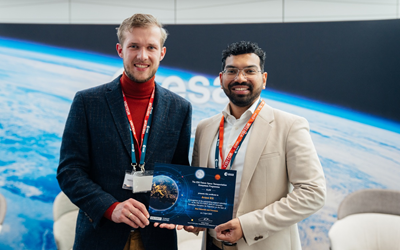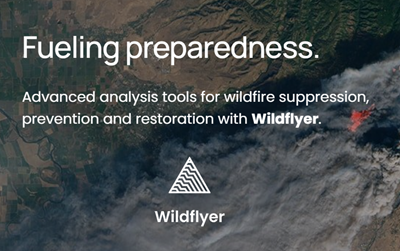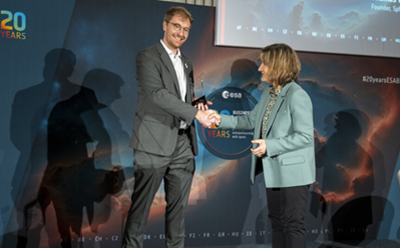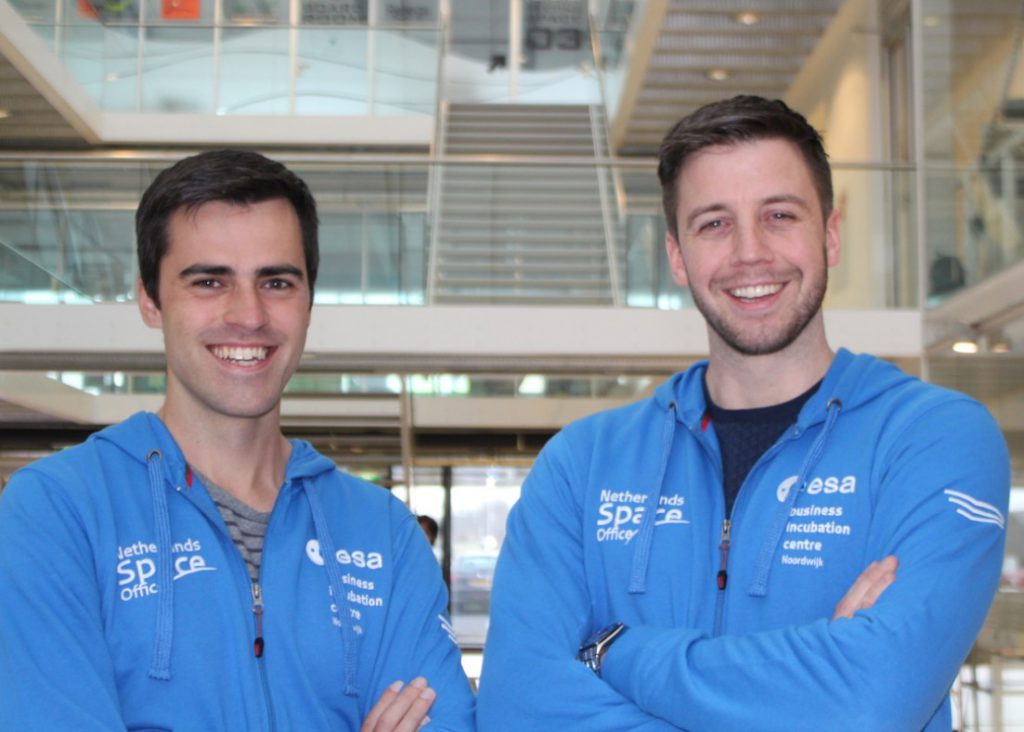
For a year and a half now, doing tough things first has paid off for Bart Slinger and Niels Klink. These two founders have the rare combination of technical skills and a sense of knowing what to do at the right time. Because so far, this approach has led them to grow without external financing. Here’s the story of Mapture.ai.
Mapture.ai automates drones and their processes, which saves time and money. For instance, it can take off and land automatically and it does scans from above automatically. It does so with a ‘drone in a box’ solution, a docking station where the drone is stored and where it can reload. Of course, the triggers are programmed and defined by humans.
The name Mapture.ai is a clever play of words. It stands for “mapping, capture and aerial imagery”. That makes it a future-proof name. Because in the basics, Mapture automates processes. It doesn’t have to be with or on drones per se. “Working with drones now is a means to reach a goal, not the goal itself”, says Bart.
Origins of a technical team
Bart and Niels met at a company where they were employed since 2016. There they were working on a so-called hybrid drone-in-the-box system with a fixed wing drone for the agricultural sector. Even though they produced a working prototype, the company didn’t manage to secure funding for further development. It was too early for this hybrid concept.
“At that time we thought: If we can build such a complex hybrid system, can we perhaps build something simpler and smaller that provides value for customers right away? A quadcopter will probably suffice for most applications. Next to that: when you’re growing crops, it’s a long term project so you couldn’t tell immediately how much the system benefits you. It was hard to sell.”
With years of experience working with autonomous drones, Bart and Niels decided to start their own business. “It was a waste of experience if we didn’t create our own solution we ourselves believe in”, Niels says.
So they did. Starting with some spare parts, they built a quadcopter and a wooden box. They started with the most difficult part, which is automatically landing in the box. “When you solve the most challenging problems first, you can solve the others as well”, says Bart. Then they developed a MVP dashboard for users to see the camera imagery.
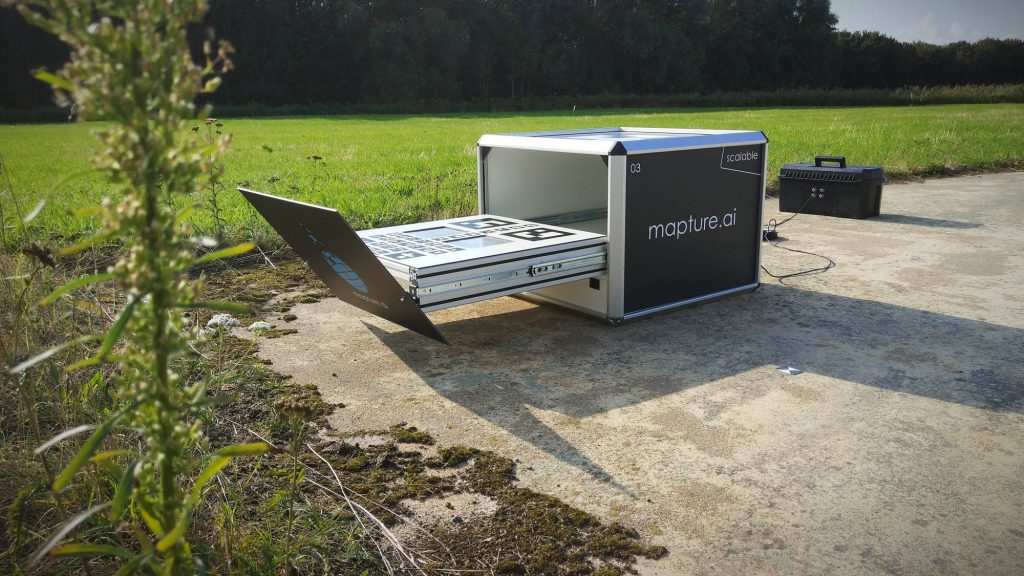
Security sector
So technically they know what needs to be done, but agriculture turned out to be a difficult industry with small margins. So they went for another sector that could benefit from their solution: security. Why is that?
“In security, guards are obliged to check the scene after a report. That can take up to 30 minutes. To shorten that time, you can deploy drones locally so you have moving imagery way faster. It’s also safer for guards”, says Bart. “So, you’re buying speed. You are faster than a person to reach a certain hard to reach area. That’s easy to explain – and to sell.” He also addresses the plethora of opportunities in this sector: “For instance, you can connect the Mapture system to an alarm system, or let the drone do surveillance in a bigger and more advanced version of our system.”
Business model & legislation
The startup is thinking of a lease structure for our clients. Niels: “It has everything to do with legislation. Right now, we are still obliged to be ‘in control’, so stand next to the box or watch the live camera images remotely. So we fly BVLOS – beyond visual line of sight.”
The situation with the law right now is a classic example of current developments being ahead of legislation. Niels: “The weird thing is: you still need a pilot license for operating a drone. They have the same legislation as that of a Boeing 747. So in our textbooks we found instructions on what to do when there’s fire on board. And it takes a lot of time and money to get that certification. So when people want the system now, they don’t need to get that pilot license themselves. You lease it so we got that covered.”
However, Mapture is preparing for a world where drones can fly truly autonomously. And the timing is on their side, as new legislation in The Netherlands is on the verge of being created – later this year. Niels: “Drone legislation is moving towards a ‘no, because …’ to a ‘yes, provided that …’.”
Launching customer
Before entering the security sector, Mapture has Rijkswaterstaat (RWS) as a launching customer. RWS is responsible for the construction and maintenance of main infrastructure in the Netherlands and part of the Dutch Ministry of Infrastructure and Water Management.
One of their use cases: scanning for oil leakages. On April 6, they will demo their solution in Nijmegen for the minister Cora van Nieuwenhuizen, at the launch of a new test center. Together with RWS Mapture is also working on improving current legislation.
Short term / Long term
The short term goals are clear for Mapture: develop a system for security and be on top of new legislation. “A real long term vision would be to create a network of systems, so a drone can move autonomously from docking station A to docking station B to docking station C. Endless possibilities”, says Bart.
Mapture also has thought of a next market for their solution: the volume measurement of stockpiles. Niels: “This happens already at companies at least every week. But those drones need pilots. The business case is already there: we can do it cheaper and more often.”
Why ESA BIC?
“It became quite clear that the autonomous landing would be a technical challenge. So we sought help in the space sector – to help us with improving the accuracy of the combination of GNSS, markers and camera imagery. Also, we try to research here how we can prevent the jamming and spoofing of GNSS signals”, said Bart.
Entering ESA BIC Noordwijk was something the both founders were eyeing on for a while, but they waited for the right timing. Now the legislation is almost in their favor, they made a calculated choice to enter the program at the end of 2019.
Why did they want to join? “There were multiple factors for us to enter the program. First, it has a track record of a lot of drone and GNSS startups who have been quite successful. Second, our strength is technology, so we profit from the business and marketing support and workshops”, the founders say. “We have a hunch of what’s necessary on that front but it’s not our expertise like technology is. Of course, you can have that at any incubator or accelerator, but combine it with the equity-free 50.000 euro that will be compensated and it’s a no-brainer actually.”
Don’t worry over minor issues
Like many entrepreneurs in software, delivering a minimum viable product is key. In hardware that’s not so common. Mapture develops both, and chooses to make simple yet functional hardware solutions first as well. Niels: “As long as we are able to show the broader idea of things, that’s ok. That’s the way to move forward fast. Sometimes we say to each other: ‘Time to zoom out, we overthink too much now’. Just make this feature, and if we encounter a problem, we’ll fix it later.”
Such an approach is only possible if you recognize big issues first. “That’s why we tackle bottlenecks first (like autonomous landing). A lot of people just start with the easy stuff – take the path of least resistance. But in the end you’ll waste time if you don’t fix the bottleneck. What if you spent all that time on minor issues and you have to start over again?”
An example: “At a point we worried if the box’ material would corrode when exposed to rain. Or if water would drip in and ruin the technology. We just let it go and let it stand outside for 3 months in extreme weather conditions. Nothing bad happened.”
Autonomous growth
One thing Bart and Niels were sure about, is wanting to grow without external financing. “Of the things that didn’t go well at our previous job, this was also one of them. First, the money came too early, because the legislation wasn’t ready yet. Second, the moment the money was raised, a clock went ticking. There was constant pressure from the investor to perform. Combine those two and you can see where it went wrong.”
So how did Mapture get the money to both work full-time on this business? Niels: “We did some pilot projects outside the security sector. With that money we could pay ourselves, get certifications and invest back in the company. That’s the thing with organic growth: sometimes you have to take a side step. But always keep in mind to follow your own path.”
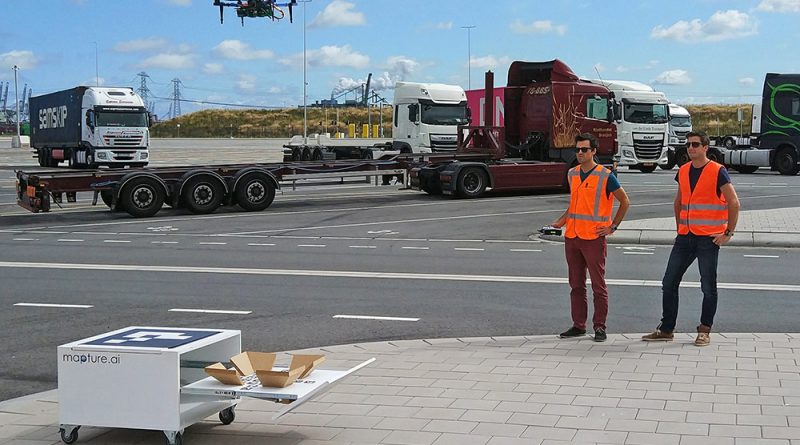
Scary movies
Sometimes the balance between business and private life is heavily disturbed, the founders say with a wink. Bart has one of the drone-in-a-box systems in his living room, he tells. “When Niels is remotely testing the system, he once hit all the clothing from my laundry rack. And it’s quite the scare when you suddenly hear the system starting when you watch a scary movie.”
